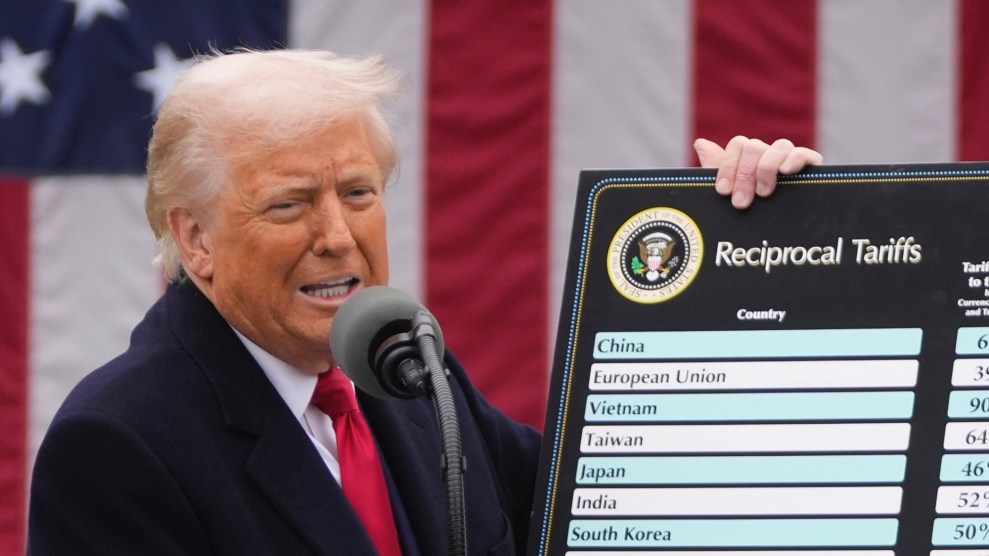Politics
Trump Acknowledges Tariffs Impact as Grocery Prices Soar

President Donald Trump has acknowledged that the tariffs his administration implemented in April have contributed to rising grocery prices. On a recent Friday, the Trump administration announced exemptions for a variety of staple foods, including beef, coffee, and bananas, from these tariffs. This decision marks a significant shift as Trump had previously maintained that his tariffs would not increase consumer costs.
The exemption is seen as an attempt to alleviate the financial strain faced by American families. Over half of Americans have reported that food prices are a major source of stress in their lives. This move comes after the Republican Party experienced notable electoral setbacks in recent elections, including defeats in the Virginia and New Jersey gubernatorial races, as well as local contests. In contrast, Zohran Mamdani, a democratic socialist, won the New York City mayoral race, campaigning on an affordability agenda.
In a discussion on Fox News on November 5, the day following the elections, Trump emphasized the importance of affordability, a term he claimed was being increasingly used by Democrats. Though he asserted that his administration had made prices more manageable, he also expressed concern that the Republican Party was not adequately addressing the issue.
Trump reiterated this message on his platform, Truth Social, declaring that “AFFORDABILITY is a Republican Stronghold.” Recent polling shows that inflation has decreased from its peak in 2022, but data from September indicates that grocery prices have continued to rise since Trump’s presidency began, with costs escalating at their fastest annual rate since 2022.
The AP-NORC August poll revealed that grocery costs significantly impact the daily lives of many Americans. Despite warnings from economists and the nonpartisan Congressional Budget Office, Trump has consistently claimed that his tariffs do not raise prices. The recent decision to roll back some tariffs suggests a recognition of their impact on consumer expenses.
During the announcement, Trump mentioned, “We just did a little bit of a rollback on some foods, like coffee as an example, where the prices of coffee were a little bit high. Now they’ll be on the low side in a very short period of time.” Coffee prices rose by 19 percent over the past year, significantly affected by a 50 percent tariff placed on Brazilian imports, amid ongoing legal issues surrounding former Brazilian President Jair Bolsonaro.
An October poll by CNN indicated that fewer than one-third of Americans believe Trump has fulfilled his promises regarding affordability. More than 60 percent of respondents feel that his policies have worsened the economic conditions in the country. This situation highlights the challenges the Trump administration faces as it navigates public perception and economic realities in the lead-up to the 2024 elections.
-

 Politics3 weeks ago
Politics3 weeks agoHamas Chief Stresses Disarmament Tied to Occupation’s End
-

 Science3 weeks ago
Science3 weeks agoOhio State Study Uncovers Brain Connectivity and Function Links
-

 Entertainment3 weeks ago
Entertainment3 weeks agoMegan Thee Stallion Exposes Alleged Online Attack by Bots
-

 Science1 month ago
Science1 month agoResearchers Challenge 200-Year-Old Physics Principle with Atomic Engines
-

 World2 weeks ago
World2 weeks agoFDA Unveils Plan to Cut Drug Prices and Boost Biosimilars
-

 Entertainment3 weeks ago
Entertainment3 weeks agoPaloma Elsesser Shines at LA Event with Iconic Slicked-Back Bun
-

 Top Stories3 weeks ago
Top Stories3 weeks agoFederal Agents Detain Driver in Addison; Protests Erupt Immediately
-

 Business3 weeks ago
Business3 weeks agoMotley Fool Wealth Management Reduces Medtronic Holdings by 14.7%
-

 Entertainment2 weeks ago
Entertainment2 weeks agoBeloved Artist and Community Leader Gloria Rosencrants Passes Away
-

 Business3 weeks ago
Business3 weeks agoHome Depot Slashes Prices on Halloween Favorites Up to 75%
-

 Politics4 weeks ago
Politics4 weeks agoNHP Foundation Secures Land for 158 Affordable Apartments in Denver
-

 Top Stories3 weeks ago
Top Stories3 weeks agoOrioles Hire Craig Albernaz as New Manager Amid Rebuild









